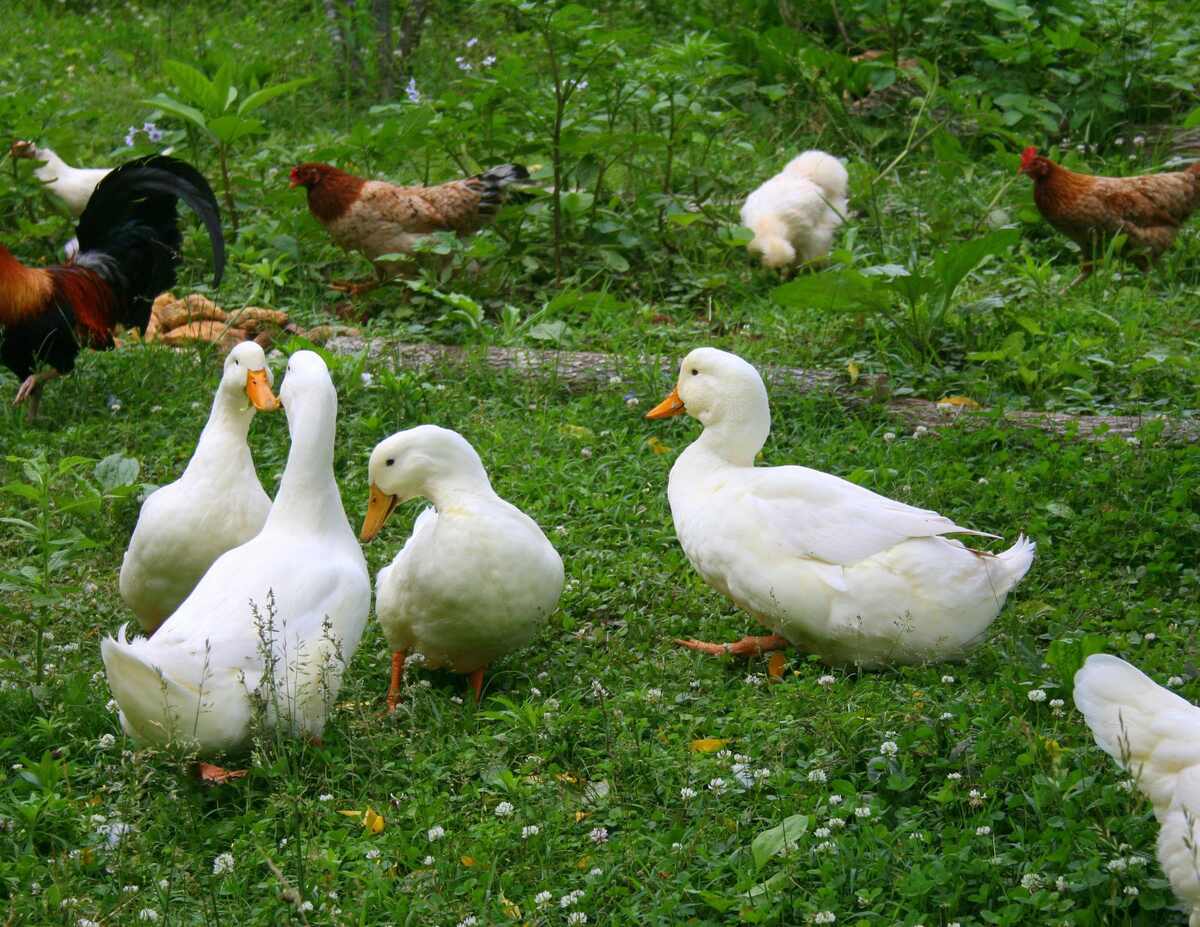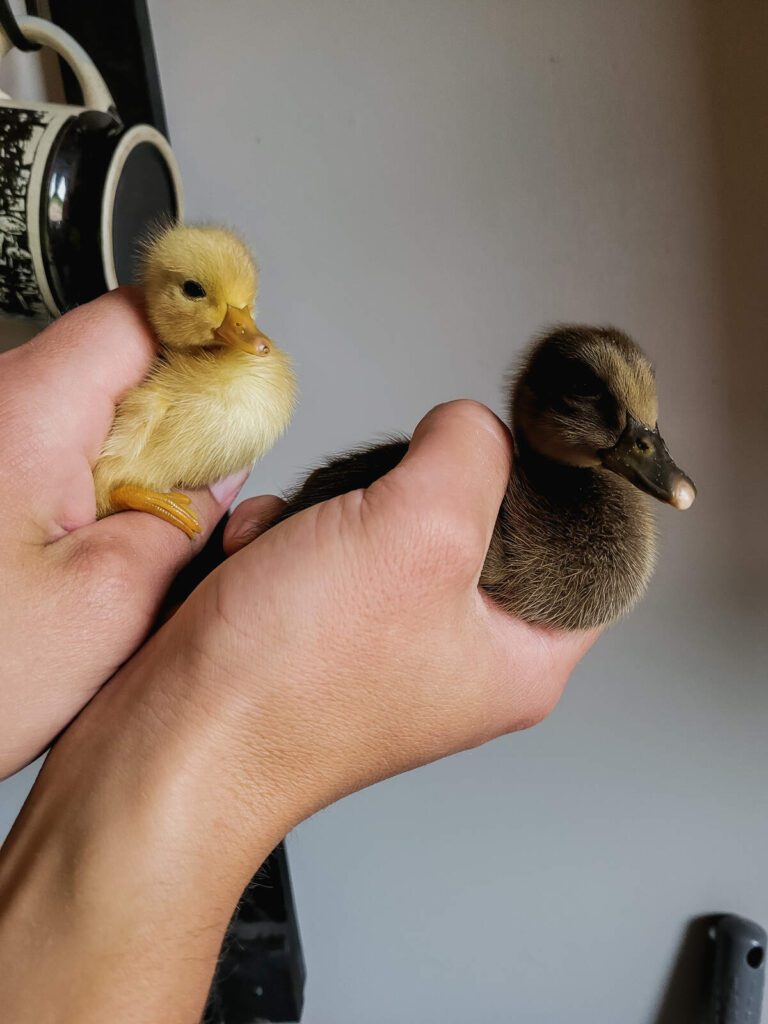Owning Ducks vs Chickens Which One Is Right For You?
Thinking about owning ducks vs chickens and wondering which is a right for you? This is a great question for new homesteaders, hobby farmers, someone interested in getting a regular egg supply or anyone just wanting some cute bird friends. Choosing between these two lovable poultry birds is an exciting yet challenging decision. Ducks and chickens are very different species, each having their own specific pros, cons, personalities, wants and needs.

I personally, have been a life long duck lover. I much prefer a quack over a rooster crowing at 4am. Although I have owned both ducks and chickens for almost all of my life. Today I’m going to lay out the differences owning ducks vs chickens so that you can make the best informed decision before buying your new flock.
This post contains affiliate links, which means I make a small commission at no extra cost to you. Please read my full disclosure policy

Questions to ask yourself before buying ducks or chickens:
What is the climate like where I live?
How much space do I have available for them?
How much time do I want to spend with these birds?
Are they allowed where I live, are there limits to how many I can buy?
These questions will help you narrow down your choice once I explain the differences between owning ducks vs chickens.
Ducks are delightful:
Ducks are such lovable, quirky creatures with their webbed feet, classic bills and unique personalities. Each one has its own charm, and they’re always a joy to watch. Generally peaceful and social, ducks make great companions in the yard. I’ve never seen one act aggressively toward a human, even during mating season!
Female Ducks lay large eggs that have rich and creamy yolks. Ducks are cold hardy birds. Duck are waterfowl, and do require fresh water access during all weather to stay healthy and keep laying eggs. If you have a small pond or natural water source, backyard ducks may be an excellent addition to your yard!

Cheerful Chickens:
Chickens are full of personality, antics, and just plain mischief at times. Generally personable, although some roosters can be very territorial which is an important consideration if you have young children. Chickens love to scratch around the yard, perch on your porch, and may even wander into your house if the door is left open. They are known for the eggs they lay, people also like to use chicken poop for garden fertilizer, and they are one of the most common meats to eat in the US. Chickens are definitely a multi use bird and great addition to almost any backyard.
While there are many differences between owning ducks vs chickens, I have tried to lay out key differences that are important to know before making the decision between owning ducks vs chickens.

Housing needs:
Ducks need 24/7 access to water that they can dip their whole head in, so a duck coop floor that accommodates that need is a must. Otherwise, you will have a mucky coop situation very quickly. Having an area in the coop with a grate that the splashed water fall into is a great way to accomplish this. Ducks however, do not need nesting boxes to lay eggs in, or roosts like chickens do. Ducks prefer to lay their eggs and sleep on ground level.
Chickens are easy to please as far as water is concerned, any chicken waterer will do. They do however love to sleep up high so having a roost available for them is necessary. Chickens also prefer to lay their eggs in nesting boxes so they need some sort of nesting area available. Both species of birds do free range quite easily. They love to get out of their coop first thing in the morning, and typically will return to their enclosed area at dusk.

Environmental needs:
Ducks need access to water they can swim in and properly preen their feathers to stay healthy. This can be a kiddie pool, small pond, shallow plastic bin, stock tank, anything that can hold water. Fresh water can be especially challenging during the winter to maintain. However, chickens do not need anything besides a regular chicken waterer and it is quite easy to find heated chicken waterers. Domestic ducks typically do not fly (except call ducks, muscovy ducks, and mallards) so they generally stay within the confines of whatever space you provide. Chickens however, can and will fly even up to 8ft to escape their confined area so if you want them in a specific space, they need to have a netting over that area.

Preditors:
As far as preditors go, ducks and chickens are very similar. They are both hunted by raccoons, foxes, hawks, and even neighborhood dogs. Ducks can swim, which if you have nearby water can help save them from preditors, chickens can somewhat fly, which can also help survival during an attack. Both need adequately secured predator-proof coop at night to keep your flock safe. Both birds can cause quite the commotion at the impending threat of a predator, so keeping a camera in your coop, or having the coop close to the house are also ways to prevent or be able to save your birds during an attack.

Personality and behavior:
Ducks and chickens can both have big personalities, but there are some distinct characteristic differences between these two birds. Pet ducks tend to be more sociable than chickens. They form strong bonds with their owners and their flocks. They will be very sad and loud if you separate them from each other, they always roam around together in as a tight knit group. Ducks are docile birds, they rarely if ever display aggression. Chickens can be very personable, but are more independent. You will often find them scattered all over the yard. They can also be more aggressive, both hens and roosters to each other while establishing a pecking order and to their owners in they happen to be in an aggressive mood. Chickens do however generally love affection and can be very friendly birds to have around the yard.

Nutritional needs:
Chickens and ducks do have some notable different nutritional needs. Ducks need a higher amount of niacin than chickens (this is especially important for baby ducks), higher levels of niacin can usually be found in duck-specific foods. There are also niacin supplements available (like brewer’s yeast) if the need arises. Ducks are great foragers and benefit from bugs and leafy greens. Chickens generally do fine with your run-of-the-mill chicken feed. They love kitchen scraps, and scratching around the yard for bugs.

Fresh Eggs:
Ducks are known by bakers for their eggs. Duck eggs enhance most baked goods with their larger egg yolk that contains a higher fat content. They have a very thick shell, and a slightly stronger flavor than chicken eggs. Duck eggs in general are higher in nutrition because of their larger size, but also have more nutrition density. People who have a chicken egg intolerance can sometimes handle duck eggs better due to the different protein composition. Chicken eggs are the classic grocery store egg. While ducks lay almost exclusively white or light blue eggs, chicken eggs lay a wide range of colors which can be really beautiful. Chickens generally lay more eggs per year than ducks, and can be more consistent layers than ducks can. All of this depends on the breeds you decide to buy as some are higher production layers than others.

Health Considerations:
Ducks generally seem to be more resilient to health issues than chickens. Ducklings can develop respiratory issues if not kept in a well ventilated area, although chicks seem to be prone to finding unique ways of getting in trouble all of the time. Chickens seem to be more susceptible to parasites and need to be more closely monitored for external parasites which can affect their feathers and egg production. After having both species for many years, I have run into more health issues with chickens than with ducks.
Birds are messy:
Ducks can be very messy birds. They need plenty of floor space in their duck coop to keep it from getting mucky quickly. Ducks also tend to need fresh bedding in their coop more frequently due to their water splashing. They also make dirty water in record time, maintaining clean water for them is a daily chore. Chickens, tend to keep their chicken coop a bit neater. While ducks need plenty of space, you can typically keep your flock of chickens in a smaller coop. They actually spend a lot of time in their nest boxes and on their roosts which keeps their bedding cleaner longer. An important thing to note, chickens will roost on almost anything. Your porch chairs, your deck railing, even your swing set. So they can be a nuisance to clean up after around the yard.

Choosing Your Breed:
When building your backyard flock, considering the breed of the poultry is important too. There are many differences within duck and chicken breeds to consider. Call ducks, mallards, muscovy ducks, and most rare duck breeds can all fly very well. So if you live in town, clipping their feathers regularly may be required. Call ducks are tiny and adorable, but females are very loud which is also something to consider if you live in town. Indian runners are some of the best foragers, and they do not fly. So they may be a good choice if flying ducks are a concern.
There is such a wide variety of chicken breeds. You can find a chicken breed for almost any preference or need. Some chickens can be larger birds, and others can be very small size. Some are excellent egg layers, and some are best for meat. If you live in town, you may be required to only have female chickens.
Researching breeds of ducks and breeds of chickens before deciding which kind of bird fits your backyard flock best may help you with your ultimate decision. There is also the option of having a mixed flock. You do need to cater to the basic needs of both poultry species, but generally they do get along quite well together.

What kind of poultry is right for you?
Ultimately, choosing between ducks and chickens comes down to your personal situation and preferences. By considering these key differences, your space, and climate, you can decide which bird is the best option your lifestyle and preferences. As you consider the decision between the personable duck and the mischievous chicken, trust your instincts to choose perfect addition to your homestead. Whether you’re drawn to the friendly, social nature of ducks or the versatile, productive traits of chickens, both provide a unique and fun experience for your family.

Which species do you think is right for you?
Please comment your experience down below!
Want to know more about me? Find my story here:
This post contains affiliate links, which means I make a small commission at no extra cost to you. Please read my full disclosure policy here








3 Comments